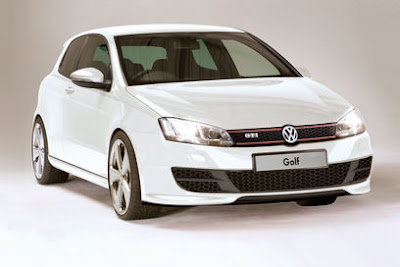The seventh-generation VW Golf GTI will head back to its roots by shedding 100kg and prioritising agile handling. At the same time, it will be more powerful, better equipped and safer than ever before.
The Golf GTI invented the hot hatch class, and has a bloodline stretching back to 1976 – and when the latest model arrives at the end of 2013 it will again push the front-drive hatch boundaries.
We’ve produced these images to show how the new GTI could look. Like the new MkVII Golf it will be based on, it’s likely to take an evolutionary approach, albeit with sharper lines down the sides. But it gets a classic honeycomb grille, red pinstripes and an offset GTI badge, plus a subtle bodykit.
VW is once again planning to show pretenders to its crown – like the new 247bhp Ford Focus ST and 276bhp Vauxhall Astra VXR – that power isn’t everything. A new direct-injection four-cylinder 2.0-litre turbo will offer around 240bhp – an 8bhp increase over the current Golf GTI Edition 35.
With more power and less weight, the 0-62mph time should be cut from 6.9 seconds to about six seconds, while top speed will rise to 155mph. A range-topping 4WD Golf R is due in 2014 with 300bhp from the same engine.
There will be a choice of six-speed manual and twin-clutch DSG auto boxes. The biggest weight savings across the new Golf range (due to debut at September’s Paris Motor Show) will be courtesy of the new MQB platform, which uses stronger, thinner and lighter hot-formed steels in its construction. Thinner seats and lighter electricals will help shed more weight.
Specific to the GTI will be all-aluminium suspension and an aluminium roof, which will not only bring the kerbweight down to around 1,300kg, but also lower the centre of gravity, for better stability and agility. Two new driver aids – an electronically controlled differential lock (VAQ) and progressive steering – will make their debuts on the GTI and ensure pin-sharp handling.
VAQ is a torque vectoring system, which actively sends torque to the wheel with most grip – in contrast to electronic differentials which brake the inside wheel to stop wheelspin.
VW Group head of chassis development Stefan Gies told us: “It means the car turns in quicker, holds its line better and can accelerate earlier.”
VW has proven VAQ is effective by fitting it to a Scirocco for the gruelling NUrburgring 24 Hours – it lapped the circuit 8.5 seconds faster than a car without the set-up. Progressive steering is a variable ratio system that exploits the adjustability of the new Golf’s electromechanical power-steering. It increases the ratio the more you turn the wheel, helping the car feel less twitchy in a straight line and requiring less lock for tight bends.
Although the GTI is lighter than before, the interior will be roomier, as the wheelbase is 40mm longer. Kit like adaptive cruise control, city emergency brake and lane keep assist will be standard. There will be a choice of three and five-door cars, priced from around £26,000.
















Very informative and seems good car,The grapevines surrounding the launch of petrol variant of the Jetta sedan from the German auto giant Volkswagen has finally found some base as the sources confirm the speculations. The Volkswagen Jetta petrol version is expected to be rolled out on the 20th of June 2012 which would be powered either by a 1.4-liter TSI engine or a 1.8-liter TSI engine but Volkswagen India is expected to equip the car with the 1.8-liter TSI petrol engine as it tried, tested and more cost effective. Along with bestowing the Jetta sedan with a petrol variant, Volkswagen is also expected to upgrade the current version of the car with an air-conditioner with climate control and xenon headlamps.
ReplyDelete